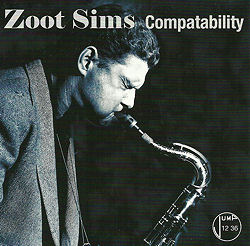1. The Way You Look Tonight
2. Nash-Ville
3. You Don't Know What Love Is
4. Compatability
5. The Way You Look Tonight
6. Nash-Ville
7. You Don't Know What Love Is
8. Compatability
9. The Way You Look Tonight
10. Nash-Ville
11. Studio Chatter
12. Compatability
13. Nash-Ville
Hall Daniels - Trumpet
Dick Nash - Trombone
Zoot Sims - Tenor sax
Bob Gordon - Baritone sax
Tony Rizzi- Guitar
Paul Atkerson- Piano
Rolly Bundock- Bass
Jack Sperling - Drums
Delmark Records has taken over the defunct Jump label
and this is the first of what we may hope is a number of reissues
of its material. These sessions were recorded in Hollywood in 1955,
when the first four tracks were originally released on a ten-inch
LP, and tracks 5-10 were issued in 1977 on a twelve-inch LP. Tracks
11-13 have not been released before. You may notice a certain similarity
in the tune titles, which presumably derive from alternate takes of
four different compositions. Two of the tunes are jazz standards and
the other two were composed by trumpeter Hall Daniels, who wrote the
arrangements.
Despite the similarities in the material, there is enough variety to keep one's interest alive, especially in Zoot Sims' solos. Zoot had already
established his reputation in Benny Goodman's band and particularly as one of the Four Brothers in the Woody Herman ensemble. He had developed a smooth,
swinging, legato style which was very easy on the ear as well as displaying a continuous wealth of ideas.
There are some fine solos from other members of the group - notably baritone saxist Bob Gordon, whose meaty baritone sound resembled that of Gerry
Mulligan. Sadly Gordon died in a car accident only a few months after these recordings were made, but he had already made his name as one of the best West
Coast musicians. Other good solos come from Hall Daniels, Dick Nash and Tony Rizzi.
Hall Daniels' arrangements make the best use of the octet framework. As I implied when I reviewed an album by the Dave Pell Octet, this size of ensemble
allows for tight arrangements with novel combinations of instruments. Someone didn't seem to know how to spell "compatibility" but, with such pleasant
music, it doesn't seem to matter.
Tony Augarde
www.augardebooks.co.uk
